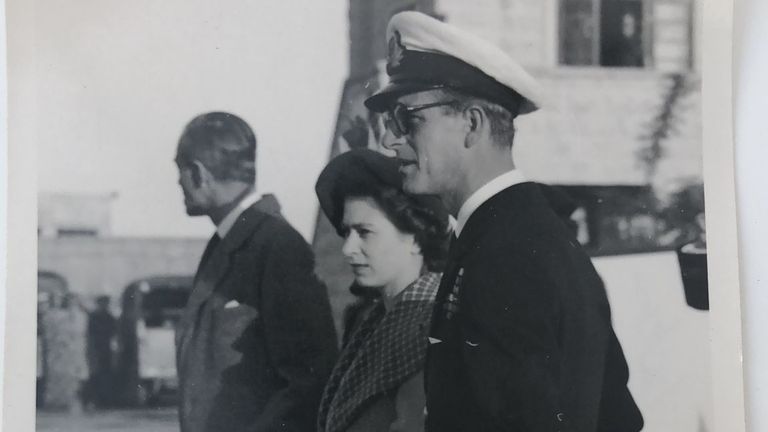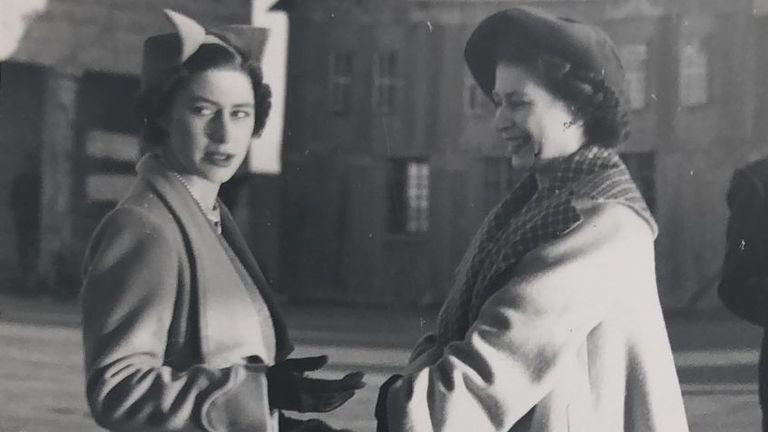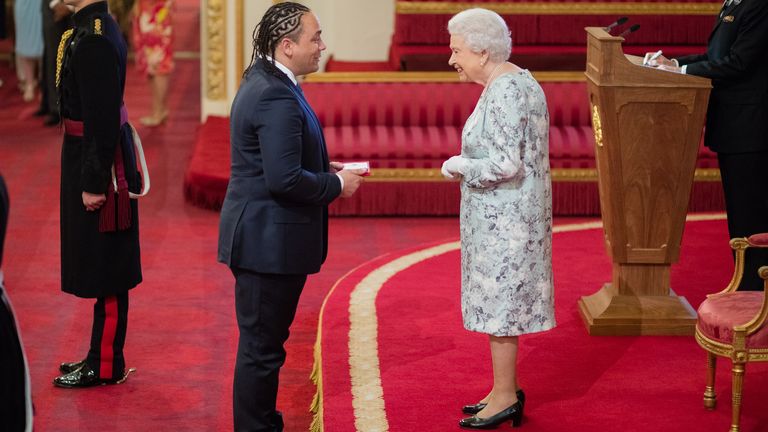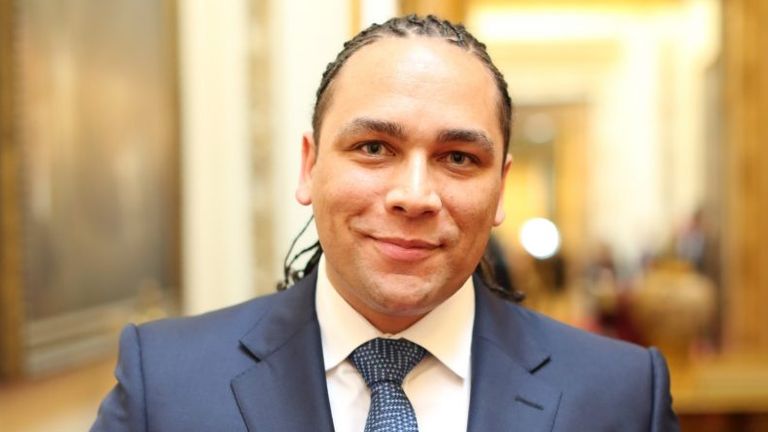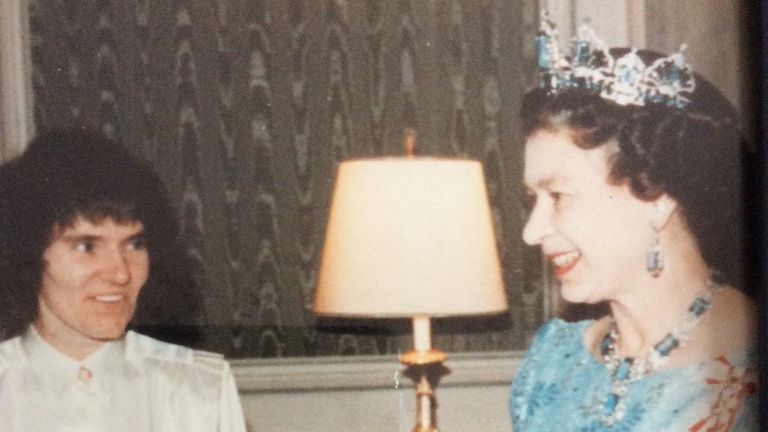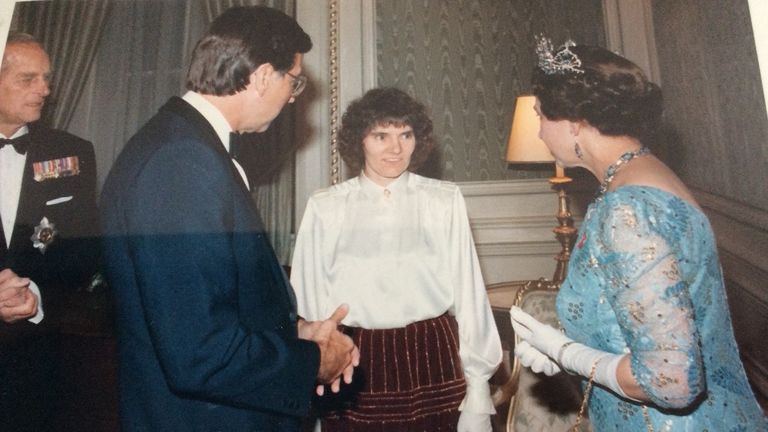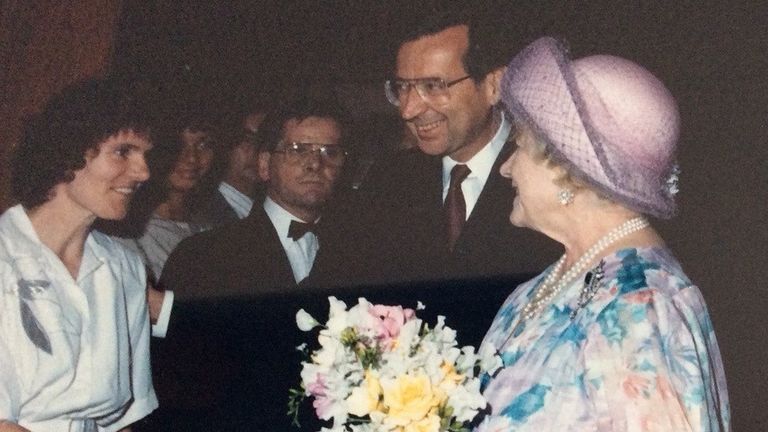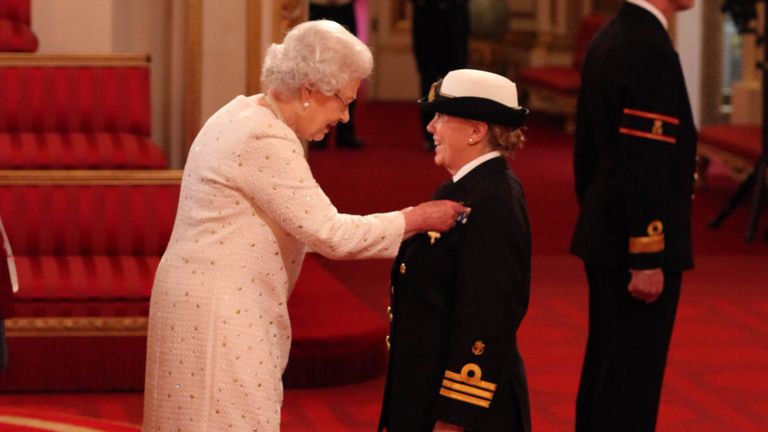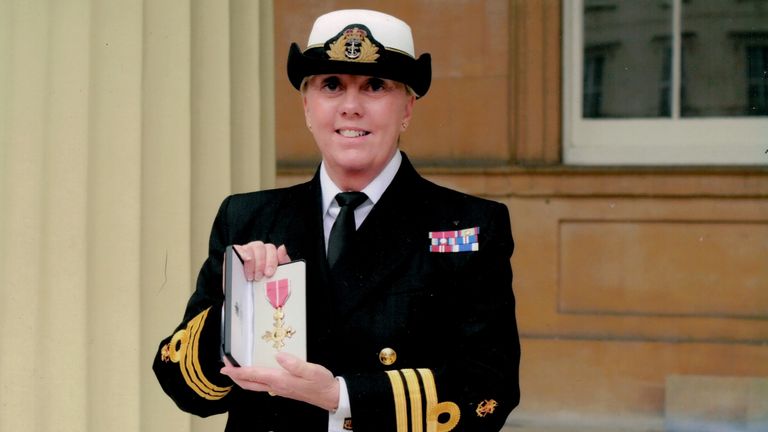[ad_1]
During each of the Queen’s 70 years on the throne, she has met thousands of people from across the UK and beyond.
From official openings of hospitals, schools and train stations to state visits abroad and tea at Buckingham Palace, ordinary people have relished the chance to share a moment with Her Majesty.
To mark her Platinum Jubilee, the Sky News Daily Podcast has spoken to four people who have met the Queen – from her days as a Navy wife in Malta in 1950 to an investiture in London in 2012 – to ask what it’s really like.
Follow the Daily podcast on Apple Podcasts, Google Podcasts, Spotify, Spreaker
Mildred Jennings
Malta, 1950
Mildred and her husband RAF husband Dougie were stationed in Malta in 1949.
The Queen and the Duke of Edinburgh lived there between 1949 and 1950 in the years before her father died and she took the throne.
Mildred arrived in Malta a few months before the Queen came to join her husband on the island.
One day, one of the other RAF wives knocked on her door to see if she’d like to have tea with the then-princess.
“Of course I said yes, naturally,” Mildred told the Sky News Daily Podcast.
She and the princess were joined by around 30 other military wives, but their interaction was fairly brief.
“I was introduced to her and she just mumbled a few words – something like ‘how are you enjoying life in Malta?'”
A few months after she got the chance to see Her Majesty again – this time at an RAF ball at the island’s Phoenicia Hotel.
Although the dress code said strictly no black, Mildred was forced to go against it when she caught word that one of the other military wives had chosen the same blue and white dress as her.
“I was absolutely horrified,” she said. “I didn’t want to go to a ball with somebody wearing the same dress.
“So against all orders, [the dress I chose] was a black dress – it suited me and I liked it, and I thought ‘well, I’ve got to have it.”
Luckily the Queen’s lady in waiting was also wearing black, she said.
At the ball she discovered the Queen was a good dancer after her husband’s co-pilot was chosen to dance with her, she added.
The last time she saw the Queen was at RAF Luqa’s airfield.
“I just finished playing tennis with my husband and we were walking back to the car when I saw the Queen with the Duke,” she said.
“She was meeting Princess Margaret off her plane – she had come to stay with her, so I took a photograph of it.
“She was descending the steps and then she came over and kissed her sister, which was rather nice and very informal.”
Alex Holmes
Buckingham Palace, 2017
Alex met the Queen at Buckingham Palace after becoming part of the Queen’s Young Leaders Programme for the anti-bullying ambassador scheme he set up at his school in Milton Keynes.
The idea came to him after suffering racist and homophobic at school himself.
Ten years on, Alex’s organisation had trained 40,000 anti-bullying ambassadors across 4,500 UK schools.
This saw him chosen as one of the Queen’s leaders from the Commonwealth, representing the UK, which he says was the “honour of his life”.
When the young leaders visited Her Majesty at Buckingham Palace, Alex said she was “very generous with her time”.
“I felt that she was quite good at banter because she had a bit of a joke with me about how I didn’t have to travel very far compared to the other recipients from the Commonwealth,” Alex said.
They spoke about bullying, which she agreed was a serious issue that needed more focus.
“We talked about Prince William, because I’ve done quite a bit of work with him on things like cyberbullying and mental health – she was really proud of him,” he added.
Alex said the Queen “has that smile which really puts you at ease” and said he felt the pair had a “connection”.
They also talked about the leaders programme’s discussions around the Commonwealth, which weren’t always positive.
“As part of this experience we were really encouraged to look at the complex nature of the Commonwealth,” he said.
“We know history hasn’t always been positive, but this was about looking at it and acknowledging that.
“It felt like to me the Queen was giving her blessing to that and that we should come together and look at what it means to be part of the Commonwealth and what the future of the Commonwealth means.”
Marilynn Domleo
Quebec, 1987
Marilynn grew up in care, moving from Yorkshire, to Derbyshire and the Midlands until she left the system at 19.
She was planning on moving to Europe to start a new life when she heard of a nannying job in Montreal.
Having got the job, at the age of 22 she moved to Canada, and was working as a housekeeper for the then-prime minister of Quebec Robert Bourassa in 1987 when the Queen visited.
When Mr Bourassa mentioned in passing about Marilynn’s difficult start in life, the Queen requested to speak to her in person.
To her astonishment, she was granted a 15-minute private audience with her.
“She was very happy to meet me. And she was genuinely interested in what you had to say to her,” she said.
Asked what it was like, she added: “It was like as if time was just stood still.
“You know, as if you’re meeting a friend and just chattering away and the time goes.
“This is what I felt happened when I met with her.”
Describing it as “beyond my wildest dreams” and a “great privilege”, Marilynn said that the surprises continued about a week later, when she received a present from Her Majesty.
It was a photo album of the official visit, personally signed by her.
“I cried for a little bit at first, because I was astounded that somebody could do such a kind thing… I found it quite emotional.”
Carol Betteridge, OBE
Buckingham Palace, 2012
Carol Betteridge had been in the Royal Navy for 20 years when she flew to Afghanistan to become the commander of the field hospital at Camp Bastion in Helmand Province.
On her return she was awarded an OBE for her military service and went to Buckingham Palace for the investiture, not expecting to meet Her Majesty.
“She had been suffering from a back injury… so it was only right at the last minute that we were told she was going to be there,” Carol said.
“So it was even more special than it would have been. She’s known as the boss – that’s how we refer to her – she’s the one that puts duty before herself.
“So it’s really special for any member of the armed forces to meet Her Majesty.”
Military investitures are usually left until the end of the day, allowing the member of the Royal Family on duty more time to speak to people.
“I think she also perhaps takes a little bit longer to chat to people that have been deployed and been through difficult circumstances,” Carol said.
Asked what their conversation was like, she replied: “I just said how special and lovely it was to see her back on duty and to congratulate her for being there.
“I couldn’t help myself – we had a little quiet smile between us I think.
“She thanked me for asking about her and thanked me for my leadership and the duty I’d performed in looking after injured armed forces personnel.
“She’s so gracious, she just said thank you so much for what you’ve done and please accept this award. It’s simple, but really special and something I’ll never forget.”
Carol also got to meet her at a hospital opening in Birmingham in July 2012.
Commenting on that interaction, she added: “She always gives you the sense of her care and compassion for everybody she meets.
“She’s just got that aura around her… she’s such a special lady.”
[ad_2]



